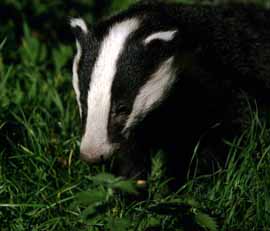Badger cull blocked by Wales’ Labour government

Farmers have reacted angrily after the Welsh government shelved a badger cull to control bovine TB.
Wales’ newly-appointed environment minister, John Griffiths, announced on Tuesday 21 June that proposals for a pilot badger cull in north Pembrokeshire would be put on hold.
The Labour government will now form a panel to review the science behind the plans and other TB measures which formed the previous government’s TB eradication policy.
Mr Griffiths’ announcement comes after figures release by the Welsh government earlier this year showed that the number of cattle infected with bovine TB had fallen dramatically in Wales, with nearly one-third fewer cattle slaughtered in the past year.
Between January and October 2010, 6,587 cattle were slaughtered in Wales because of bovine TB, compared with 9,146 during the same period in 2009. This represents a 28% decrease. There were similar trends in 2004 and 2006.
The statistics were used by wildlife campaigners to argue that cattle controls hold the key to fighting bovine TB and not a cull of badgers.
Last year, farmers were subjected to a tight testing and movement regime and had accepted this on the understanding that the government would implement controls on wildlife.
Stephen James, deputy president of NFU Cymru, warned that this support could now waiver.
“Farmers are extremely angry. They have absorbed without being vociferous these extra control measures, mainly because they were of the opinion that the government was going to do something about the wildlife aspect of this disease. I am sure they will be a lot more vociferous in the future,” said Mr James, who was at the Senedd in Cardiff to hear Mr Griffiths’ announcement.
However, he urged farmers not to lapse on biosecurity. “Biosecurity is a vital component in the fight against TB. I hope that on-farm measures will not change, because farmers need to protect their stock,” he said.
Although Mr James accepted that there had been a marked reduction in bovine TB, he said the trend was still upwards and science supported a cull of infected wildlife.
“Perhaps there are not as many cases of bovine TB as there were in 2009, but the disease is still on farm. Farmers are still losing cattle at an unacceptable rate and dealing with massive restrictions and the stigma that goes with the whole thing,” he said.
Speaking outside the National Assembly, Farmers’ Union of Wales TB spokesman and vice president Brian Walters said: “The previous policy was based on firm scientific evidence which shows badger culling in north Pembrokeshire would significantly reduce TB in cattle.
“The latest scientific evidence, released in April this year, simply reinforces that previously policy. It shows a 31.5% reduction in confirmed TB herd incidences in English badger-culling areas over the four-and-a-half year period after badger culling ended, and a reduction of 37% in the six months to March 2011.
“Cattle farmers are being crippled by this disease, are incurring massive extra costs and are seeing their businesses locked down, particularly in north Pembrokeshire, where harsh restrictions have been in place for well over a year.”
